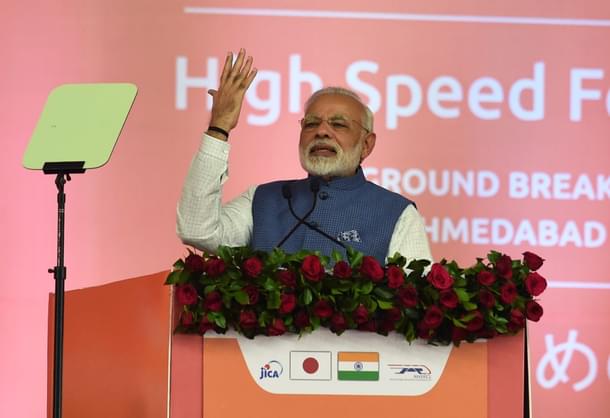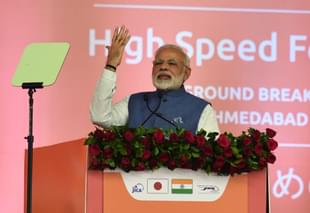Current Affairs
Morning Brief: Modi’s Strong Defence Of Economy; RBI Warns Against Stimulus; States Asked To Cut Fuel Taxes
Swarajya Staff
Oct 05, 2017, 06:23 AM | Updated 06:23 AM IST
Save & read from anywhere!
Bookmark stories for easy access on any device or the Swarajya app.


Good morning, dear reader! Here’s your morning news and views brief for today.
Modi’s Strong Defence Of The Economy: Prime Minister Narendra Modi on Wednesday acknowledged that the country’s economy had plunged in April-June quarter but firmly insisted that this is not the first time that the gross domestic product (GDP) has fallen to 5.7 per cent and his government would certainly reverse the slide. Modi said creating an atmosphere of gloom over one quarter of slow growth was not justified. Pointing out that even the Reserve Bank of India has predicted 7.7 per cent growth in the coming quarters, Modi said, "I assure that the steps being taken by the government will put the country in a new league of development... I will not let the present problems jeopardise the future of the country." Modi defended demonetisation, saying that the cash to GDP ratio has come down to 9 per cent after demonetisation as against 12 per cent before 9 November 2016. "Three months after goods and services tax (GST), we have got feedback on all nitty-gritty, and I have told the GST Council must review all problems now," Modi said.
RBI Warns Against Fiscal Stimulus: The Reserve Bank of India (RBI) on Wednesday warned that the government needs to be cautious on fiscal stimulus even as the economic growth slows. The government has been reportedly mulling a stimulus package of nearly Rs 50,000 crore to revive the muted economic growth in the current financial year. Referring to a 2005 study, the central bank said, “higher fiscal deficit per se can lead to an increase in inflation expectations and actual inflation". The bank pointed out that farm loan waivers combined with a potential stimulus, can result in a one percentage point slippage in fiscal deficit which is pegged at 3.2 per cent for 2017-18. “Such a slippage can stoke inflation by 0.50 per cent on a permanent basis,” RBI warned.
Construction Of Nagpur-Mumbai Super-Highway To Start In January: Construction work on India’s biggest super-highway project will commence in January 2018, and it is expected to be completed within three years. The Rs 46,000-crore Nagpur-Mumbai Super Communication Expressway or the Maharashtra Samruddhi Mahamarg, a brainchild of Maharashtra Chief Minister Devendra Fadnavis, involves a 701-kilometre high-tech high-speed road that would pass through 10 districts and connect 24 of the 36 districts in Maharashtra. "We expect the construction to start by January 2018 and it is likely to be completed well within three years," Minister for PWD (MSRDC) Eknath Shinde said. Stating that the state government has already acquired around 600 hectares of land through direct purchase and has received consent regarding 2,750 hectares of land, Shinde said the remaining land will be acquired soon in order to commence construction by January 2018.
Rajnish Kumar Named New SBI Chief: Rajnish Kumar was on Wednesday appointed the new chairman of State Bank of India (SBI), the country’s biggest lender. He would take over from current chairperson Arundhati Bhattacharya, who will complete her four-year term on Friday. Kumar, 59, is one of the four managing directors at SBI, looking after the National Banking Group — which covers the retail, SME and agriculture business verticals. He had joined the lender in 1980. Kumar has worked in credit, project finance, foreign exchange and retail banking. He also worked for SBI overseas in Canada and the UK. The new head will have to lead SBI through resolution of bad loans, while ensuring it supports growth by stepping up lending.
States Asked To Cut Taxes On Fuel: After slashing excise duty of fuel, the Union government now wants states to cut sales tax or value added tax (VAT) on petrol and diesel by 5 per cent to provide further relief to consumers. Finance Minister Arun Jaitley will soon write to all state chief ministers urging them to cut VAT on petrol and diesel, Oil Minister Dharmendra Pradhan said. “We have proactively cut excise duty. Now it is the turn of states to reduce VAT,” he said. The Centre, he said, sacrificed Rs 26,000 crore in revenue in the cut in excise duty. Pradhan said as a result of the excise duty reduction, petrol price has been cut by Rs 2.5 per litre and diesel by Rs 2.25. “States are the biggest beneficiary. They get all of the VAT collection plus they also get 42 per cent of the central excise collections. The amount remaining with the Centre is used to finance centrally sponsored schemes in states,” he said.
After A Dip, Economy Bouncing Back: Amitabh Kant: After a “little bit of dip”, the Indian economy is now bouncing back, NITI Aayog Chief Executive Officer Amitabh Kant said on Wednesday. “We’ve been growing at 7.6 per cent... There has been a little bit of dip in the economy but we are bouncing back. This month’s figure seems to be good,” Kant said at a public dialogue organised by St Stephen’s College Alumni Association. He was apparently referring to the core sector growth rebounding to a five-month high in August while manufacturing activity expanded for the second month running in September. Kant said India needed to focus on exports if it wanted to grow rapidly. “My view is that we must push for exports in a very big way. We must penetrate global markets as it’ll help our people and our country to grow and prosper much more rapidly.”
Can Hold Simultaneous Assembly-Lok Sabha Polls After September 2018: EC: The Election Commission of India would be ready to hold assembly and Lok Sabha polls simultaneously after September next year, election commissioner O P Rawat said on Wednesday, a move that could cut poll costs by hundreds of crores. “We told the government what we have and what we need. We told the government about the electronic voting machines (EVMs) and other related things that we need and how much money will be required for the same,” Rawat said and added that the commission would require 40 lakh election-related equipment. “We required Rs 3,400 crore for VVPAT (voter verifiable paper audit trail) and Rs 12,000 crore for EVMs,” he said. In March last year, Prime Minister Narendra Modi had said that holding state assembly and Lok Sabha polls together would both save money and time. The NITI Aayog also circulated a paper on the possibility of holding simultaneous polls.
Dubochet, Frank and Henderson Win Chemistry Nobel: Scientists Jacques Dubochet, Joachim Frank and Richard Henderson won the 2017 Nobel Prize for Chemistry for developing cryo-electron microscopy, which simplifies and improves the imaging of biomolecules. "This method has moved biochemistry into a new era," the Royal Swedish Academy of Sciences said after awarding the 9 million Swedish crown ($1.1 million) prize. Scottish-born scientist Henderson used an electron microscope to generate a three-dimensional image of a protein at an atomic resolution, showing the potential of the technology. His breakthrough was further developed by German-born scientist Frank while Dubochet of Switzerland used rapidly frozen water to preserve the natural shape of the biomolecules.
MUST READ OPINIONS AND COLUMNS
The Long And Short Of The Indian Economy: GST is a solid achievement. The rules and the implementation will improve but the swelling demand for input tax credit must draw the attention of fiscal hawks.
A Hold On Rate Cuts, Citing Multiple Risks; Transmission Sought To Be Improved: The tone of the policy statement on the developing risks seems more hawkish than expected in the current weak growth environment. RBI’s decision to hold the repo rate seems to have centred around three metrics, in order to ‘carefully manage… the juxtaposition of risks’.
Focus On Inflation Prompts Status Quo Despite Recent Growth Jitters: MPC reiterated its focus on guarding against risks to achieving the medium-term inflation target of 4 per cent, thereby reinforcing its independence.
Foreign Reserves: The Treasure Chest The Government Can Use For Investment: The government could establish an India Infrastructure Investment Fund and start shifting meaningful fractions from the foreign reserves into this fund.
SWARAJYA SPECIAL
Once Again, Here Is Why Uniform Civil Code Is Necessary: The core idea that a citizen of the Republic of India should be answerable to the same law, endowed with the same rights and held to the same responsibilities as every other citizen should be beyond dispute.
We hope you enjoyed reading our morning brief. Have a great day ahead!
SUBSCRIBE NOW: The September issue of our magazine is out now. The cover story focuses on Pakistan, which is imploding. The terrorists Pakistan bred to bleed India by a thousand cuts are bleeding it instead – 70 Years After Its Creation, Pakistan Is A Failed State. Get a copy home and enjoy reading Swarajya in print. Subscribe here to start receiving your copies for just Rs 349.
Swarajya Apps: Enjoy reading morning brief and all other articles from Swarajya on your mobile. Download our app here on Android and iOS.




